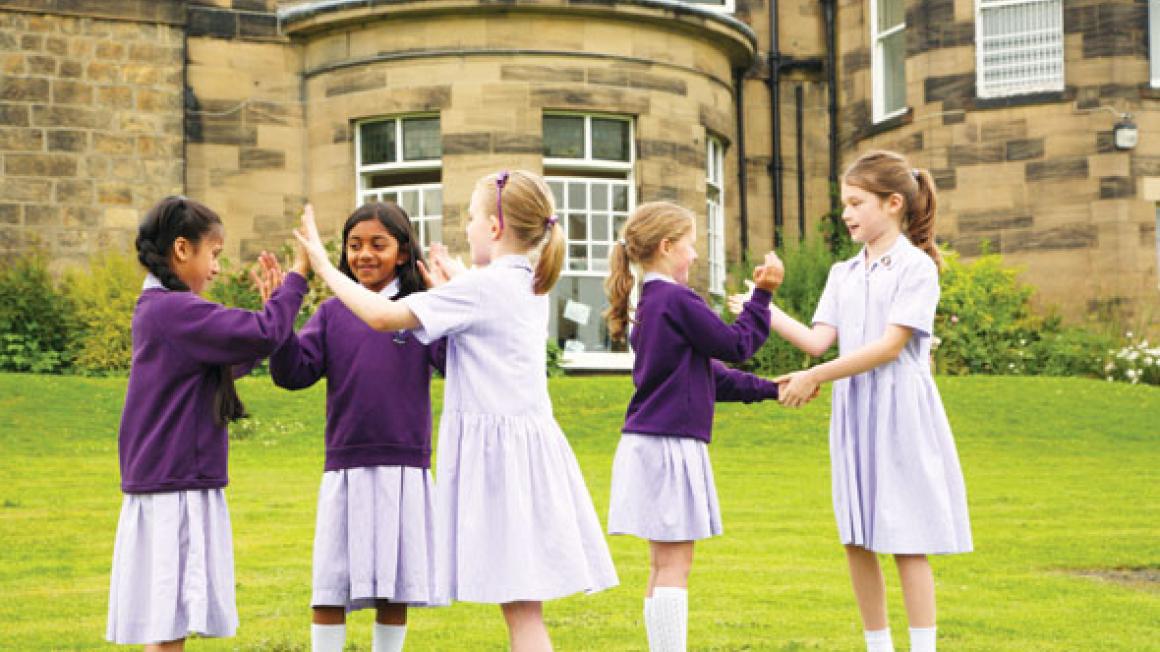Building confidence
The week, which consisted of assemblies, workshops on assessing failure and keynote speakers, did catch the headlines, and a year on, she’s still receiving requests for interviews and for advice from other school heads and deputies. It’s a subject Heather Hanbury, a former management consultant, feels strongly about. ‘It wasn’t a one-week wonder or an idea that came from nowhere,’ she emphasises. ‘When I talk to prospective parents, I say, “We will teach your daughters to fail, to get over it, learn from it and pick themselves up, and be tough, robust and resilient”.’
Taking risks
Role models are a crucial part of Hanbury’s programme. ‘I encourage our visiting speakers to talk to the girls about their failures, as well as their triumphs, because I challenge a single successful person to say that they’ve never failed at anything. Young people are inclined to think they are just parachuted into success, with no disasters along the way.’
Part of the problem is that girls like to get things right, says Helen Fraser, chief executive of the Girls’ Day School Trust (GDST). ‘That’s why an initiative such as Failure Week is so important, as it shows girls they can fail and rise above it.’ Building girls’ confidence and preparing them to take risks is often easier in a girls’ school. ‘It’s easy for boys to take airtime, but in our schools, the girls can find their own voices. We try to give them a sense of their own importance and entitlement.’
Shining role models
Hilary French, headmistress of Central Newcastle High School and president of the Girls’ Schools Association, believes it’s crucial to create an environment in which girls are encouraged to do their best but are not criticised for a stumble. ‘We will rejoice as much with hard-won Bs and Cs as with easily achieved As and A*s,’ she says. ‘We also have to educate the parents, who get so wrapped up with their children and want to take the hurt away when their daughters meet reverses. They need to learn that they should give them space to make mistakes.’
Historian Bettany Hughes and classicist Mary Beard are both products of GDST high schools (Notting Hill & Ealing and Shrewsbury respectively). The two women provide shining role models for young girls as they have combined motherhood with high-profile careers.
‘I was a bursary girl,’ says Hughes. ‘My parents were out-of-work actors who wouldn’t have been able to afford the fees. I’m immensely grateful for my school, which taught us confidence. We were led to believe all the girls were capable of fulfilling themselves.’ She also grew up at a time when the two leading people in the country (the Queen and Margaret Thatcher) were women. ‘Whatever you might have thought of Thatcher, she did show us that women could get to the very top.’
Mary Beard believes that girls ‘need role models and a good injection of confidence. The most important thing is that they find a voice they can own as theirs. As soon as you start telling girls they should aim high, you raise the possibility that they might choose to aim low’.
Encouragement can take different forms. At Moreton Hall in Shropshire, sixth-form girls have been managing their own businesses since the 1980s when they campaigned to keep the local railway station open, and ran it themselves for five years. Girls are interviewed in the upper fifth for roles as directors and junior managers for businesses that have included selling Christmas puddings made by the school chef to the retail trade. At a recent lunch, girls spoke about their business projects to 240 business people from Shropshire, Cheshire and North Wales. ‘Being involved with these businesses makes girls think about their careers in a wider way,’ says Alexandra Hankinson, the school’s marketing director. ‘It encourages them to do things that might seem scary.’
The success of Moreton’s enterprise is proven. Now in her early 30s, Fiona Marshall is head of brand marketing at online fashion retailer Asos, having cut her teeth as director of the tuck shop while at Moreton Hall. Another ex-Moreton pupil, Miranda Ballard, who runs organic meat company Muddy Boots Real Foods, came back to the school recently to give a one-hour tutorial on a retail pitch the girls are planning. ‘What we teach them at Moreton is that it’s all right to try, and fail, but it’s important to have a go.’
There are opportunities for girls in boys’ schools, too, of course, which is why they can now join the sixth form of Magdalen College School, Oxford. ‘Admitting girls and making everything available to them is a good preparation for professional life,’ says master Dr Timothy Hands. ‘It’s an equalising force in gender matters.’
The ceremonial funeral earlier this month of the UK’s first woman prime minister is a reminder of how women can overcome obstacles. ‘Women need to shout about their achievements in the workplace – as men do,’ concludes Helen Fraser


